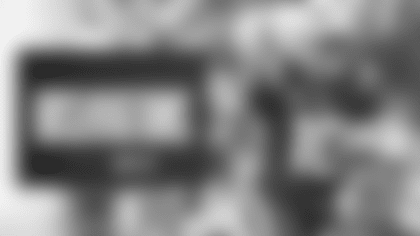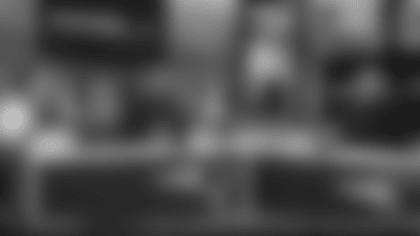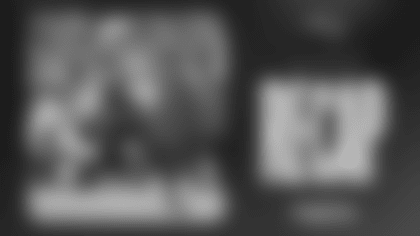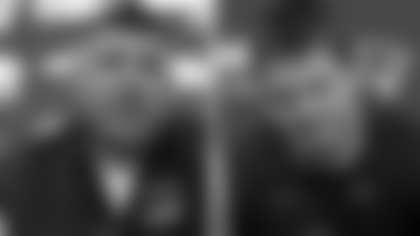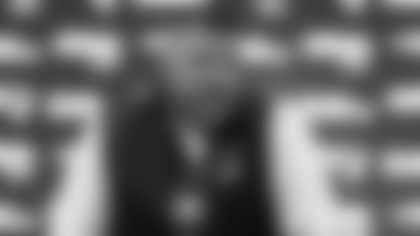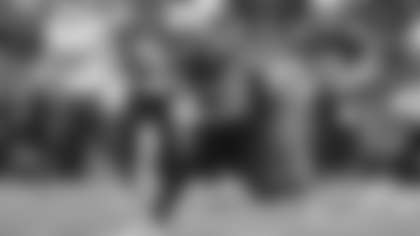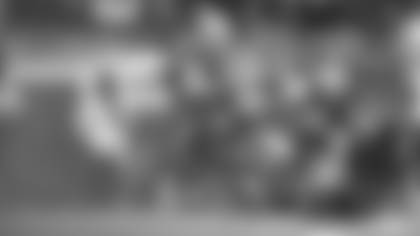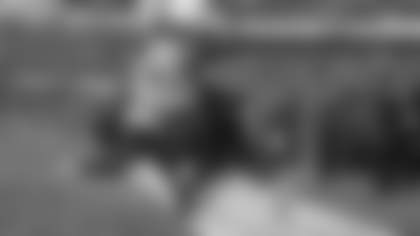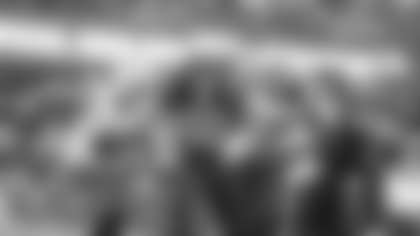Foxborough, Mass. - When Rodney Harrison intercepted Peyton Manning's final passing attempt of Sunday's AFC Division playoff game at Gillette Stadium, it put an exclamation point on a remarkable defensive performance by the Patriots.
The match up between the Colts and Patriots was billed as a battled between Manning, the NFL's MVP, and the Patriots defense, a group most aptly described as "patchwork" and playing without Pro Bowl defensive tackle Richard Seymour and starting cornerbacks Ty Law and Tyrone Poole. The undeniable storyline of Sunday's game, a rematch of last year's AFC Championship, unfolded in a manner few outside of the Patriots locker room expected as the New England defense held the Colts without a touchdown in a convincing 20-3 win.
"It was a good defensive effort by our defensive players, absolutely," Patriots head coach Bill Belichick said. "It was an outstanding effort. I thought really the whole unit did a good job. They covered competitively, they tackled well. We tried to play the run competitively and I thought it was a good, solid effort. When you a hold a team like that to three points, it was a good effort."
How exactly to answer the million dollar question of how the injury depleted Patriots defense managed to shut down Manning and the prolific Indianapolis offense is debatable. What isn't debatable is that the veteran New England defense was the deciding factor in sending the Patriots to next weekend's AFC Championship Game against the Pittsburgh Steelers. In the cold, snow and wind facing both teams Sunday, the combination of an effective game plan by the Patriots defensive coaches and near-perfect execution by the defensive players stymied a Colts offense that was the fifth-highest scoring unit in NFL history.
Belichick, barely able to hide his smile at his post-game press conference, summed up his team's defensive performance.
"We have good defensive football players and they played well," Belichick said. "They played very well. There's nothing magical. You have to give them all the credit in the world. They played their hearts out, and they have the results to show for it."
The Colts led the NFL by scoring 522 points this season, the byproduct of a 4,000-yard passer in Manning, a 1,500-yard rusher in Edgerrin James and a trio of 1,000-yard receivers in Marvin Harrison, Reggie Wayne and Brandon Stokley. None of those factors were present Sunday in conditions both teams said didn't play a factor in the outcome. Manning completed 27-of-42 passes for 238 yards, while Harrison and Wayne combined for eight receptions for 79 yards. The Colts managed 46 total yards rushing, averaging just 3.1 yards per carry, and no rushing first downs in a far cry from the 202 yards rushing performance against the Patriots for in the season-opener.
The Colts' offensive game plan under Tom Moore and their lack of production left many to wonder why Indianapolis didn't attack what many agreed was the Patriots most glaring weakness, it's secondary. With cornerbacks Asante Samuel and Randall Gay matched up with Harrison and Wayne most of the game, the Colts never fully tested the Patriots secondary. Slot cornerback Troy Brown had some trouble with Stokley, who caught a team-high eight passes for 64 yards working mostly against the converted wide receiver, but was still able to limit the big play. Manning's longest completion was for 18 yards to Harrison, and the Colts never attempted a pass longer than 20 yards downfield until their final offensive play of the game. Before the game's final drive, Manning completed nine passes of 10 or more yards, several of which were screen passes to James.
The Colts unwillingness to test the Patriots secondary played into the hands of the home team.
"If you can, obviously, eliminate the big play," Johnson said. "Maybe that was there way of ball control, I don't know. I don't know why were weren't tested more down the field. The conditions weren't great, maybe the conditions persuaded them from doing that. A big part of it was were able to stop the run and put them in more predictable situations. The offense, doing what they did, really the whole feeling of the game changed in the middle of the third quarter."
The Colts were limited to four second-half possessions, two that end in punts and two with turnovers, thanks to the Patriots ball-control rushing game that produced two seven-plus minute touchdown drives. The Colts first drive ended when they questionably elected not to go for a fourth-and-one play near midfield, while their next drive ended in a punt after five plays. The Patriots went on a 14-play, 94-yard drive on the ensuing possession to take a 20-3 lead, rendering the Colts remaining drives futile.
"We just tried to play sound," linebacker Willie McGinest answered when asked how the Patriots found success. "You can't make a lot of mistakes against a guy like that. We cut down on the penalties, played sound football, we were aggressive, we were physical, we had some turnovers and three-and-outs. And the biggest reason why we stopped them was the other side of the ball, our offense. They did a great job of running the ball, passing the ball, converting on third down and keeping us off the field."
The crux of the Patriots game plan was to force turnovers, limited the big play and disguise coverages in the secondary. The Colts stayed in their three receiver and two tight end sets most of the game. The Patriots played a substantial amount with their nickel defense in the first half, while staying in the base defense much of the second half with the linebackers disrupting the Colts' receivers off the line of scrimmage.
"I know we had a great plan, we had an unbelievable plan," linebacker Mike Vrabel said. "Our coaches, the pull together and come up with some good stuff. We were able to execute it. Just different looks. Stuff that [Manning] hadn't seen before. And limiting the running yards was crucial. I think they caught us off guard the first time around. They didn't do that today."
One Patriots defensive player described the defense as basically "vanilla." The rest was up to execution.
"It's not always the most exotic defense that's going to beat these guys," Johnson said. "It's just basic, fundamental football that wins out a lot of times. To be able to do that, we'd be okay. That's what we did. You didn't see us doing a lot of crazy things, but the things we did do [worked], and that's the bottom line."
The Colts inability to stretch the field and take advantage of the perceived mismatches against the New England cornerbacks played into the Patriots strengths. The Patriots linebackers were allowed to make plays all over the field, while cornerbacks Samuel and Gay - who displayed solid coverage - weren't asked to personally stop Harrison, Wayne and Stokley on very many occasions.
"That's what we wanted," Harrison said. "I mean, you welcome the challenge. I mean, they say we can't cover. You know, our guys were really relaxed. We just say, 'We welcome the challenge.' I mean, we welcome the challenge. No one gave us a chance. There's no reason to sit back and get nervous or play scared because they didn't give us a chance anyway. So guys did a great job. Asante Samuel, Randall Gay, they did a great job manning that coverage. It wasn't all zone. It was man?coverage as well. We were able to confuse them with some maneuvering, with some disguise, and did a great job."
McGinest said it was one of the Patriots best defensive efforts of the season.
"It's one of them," he said. "To go out and stop Peyton Manning and his offense, it's a good thing. It's kind of hard. Not many teams have stopped them all year long."
Added Johnson, "We're certainly satisfied with what we were able to do on defense. They didn't give us a chance, quite honestly. So we probably had a chip on our shoulder. I think we showed we're a pretty damn good unit."
Give credit where credit is due. Hats off to the Patriots defense.


